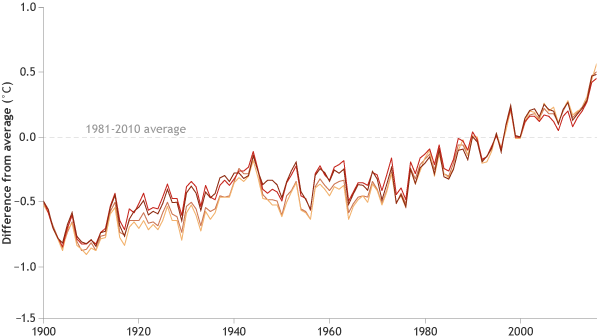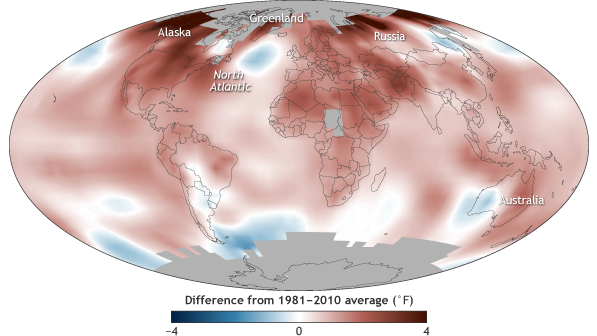In regard to a warmer planet and waters and more atmospheric moisture and the overly simplified relationship between this and more frequent and powerful atlantic tropical systems that some have tried to make:
I obtained the data for these plots from REMSS (temp), NOAA (co2) and wikipedia (atlantic hurricane season data).
Starting with the basics, the first plot is overlaying CO2 PPM in the atmosphere and increase in global temperature. The quote from one of the OPs links from a climatologist was that burning fossil fuels (anthropogenic activity) increased warming; this continues to be a very difficult relationship for climatologist to understand and model; co2 ppm increase and temperature increase.

Looking at the graph it is clear that CO2 PPM is increasing in a quite linear fashion, however while temp was increasing from 1985 through 1998 the relationship with co2 is clearly not direct or linear. Further, while co2 ppm continued to linearly increase from 1998 through 2016 the temp trend was flat until 2016. This demonstrates pretty well why our climate models aren't accurate, finding the true relationship between co2 ppm and global temp isn't simple.
The next plot is the number of atlantic tropical systems overlayed with co2 ppm.

I think this illustrates pretty well there isn't any direct relationship between co2 ppm and hurricane frequency.
The next plot is the number of atlantic tropical systems overlayed with temp (c) increase.

In 1995 there was an above average active season while temps were fairly flat, but as temp increased into 1998 for a max for nearly 20 years, there were a lot of less active seasons and not until 2003 was there a season that matched 1995 despite that temperature had been higher for a decade. The 2005 record breaking season was a decade into flat global temperatures and then there was an incredible drop off in activity while temps remained flat and then recently had another uptick.
There is clearly far more that goes into how active and how powerful tropical systems are than "burning more fossil fuels" and warming the planet. Of course part of that overly simplistic idea is the underlying premise/relationship assumed between an increase in co2 ppm and global temperatures.
I obtained the data for these plots from REMSS (temp), NOAA (co2) and wikipedia (atlantic hurricane season data).
Starting with the basics, the first plot is overlaying CO2 PPM in the atmosphere and increase in global temperature. The quote from one of the OPs links from a climatologist was that burning fossil fuels (anthropogenic activity) increased warming; this continues to be a very difficult relationship for climatologist to understand and model; co2 ppm increase and temperature increase.
Looking at the graph it is clear that CO2 PPM is increasing in a quite linear fashion, however while temp was increasing from 1985 through 1998 the relationship with co2 is clearly not direct or linear. Further, while co2 ppm continued to linearly increase from 1998 through 2016 the temp trend was flat until 2016. This demonstrates pretty well why our climate models aren't accurate, finding the true relationship between co2 ppm and global temp isn't simple.
The next plot is the number of atlantic tropical systems overlayed with co2 ppm.
I think this illustrates pretty well there isn't any direct relationship between co2 ppm and hurricane frequency.
The next plot is the number of atlantic tropical systems overlayed with temp (c) increase.
In 1995 there was an above average active season while temps were fairly flat, but as temp increased into 1998 for a max for nearly 20 years, there were a lot of less active seasons and not until 2003 was there a season that matched 1995 despite that temperature had been higher for a decade. The 2005 record breaking season was a decade into flat global temperatures and then there was an incredible drop off in activity while temps remained flat and then recently had another uptick.
There is clearly far more that goes into how active and how powerful tropical systems are than "burning more fossil fuels" and warming the planet. Of course part of that overly simplistic idea is the underlying premise/relationship assumed between an increase in co2 ppm and global temperatures.






